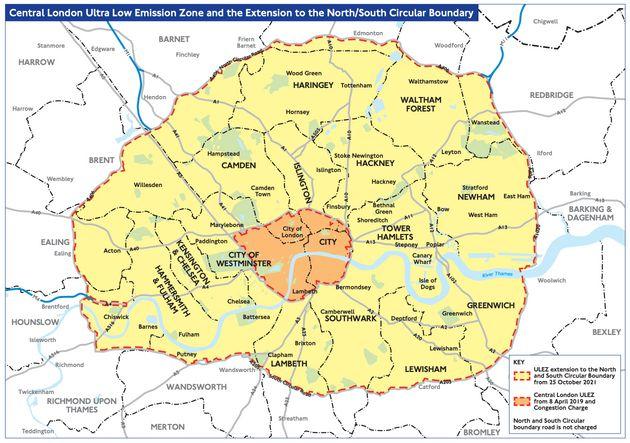London’s Ultra Low Emission Zone (ULEZ) is set to expand on Monday, yet only 43% of motorists in and around the city are aware, according to new research from used car marketplace, Motorway.
Cars, motorcycles, specialist vehicles, and minibuses will either need to meet the ULEZ emission standards or pay a £12.50 daily charge when driving within the expanded zone. While car owners can check compliance of their vehicle with Motorway’s ULEZ checker, only 35% of motorists in and around London know how to check if their vehicle will be charged.
Even fewer motorists are confident on the new boundaries. While 73% are aware Central London will be included:
- Only 29% are aware it stretches across areas of South West London (including Croydon, Kingston upon Thames, Merton, Richmond upon Thames, Sutton, and Wandsworth)
- Only 33% areas of West London (including Brent, Ealing, Hammersmith and Fulham, Harrow, Hillingdon, Hounslow, Kensington, and Chelsea)
- Only 33% in the North (including Barnet, Enfield, Hackney and Haringey)
- Only 33% in the South East (including Bexley, Bromley, Greenwich and Lewisham)
- Only 37% in the North East (including Barking and Dagenham, Havering, Newham, Redbridge, Tower Hamlets and Waltham Forest)
In fact, from 25th October, the existing zone in central London will expand to the North Circular Road (A406) and South Circular Road (A205) – potentially putting many out of pocket as they adjust to the changes. Londoners that are returning to the office even just two days a week and entering the ULEZ in a non-compliant vehicle, would incur £1,125 in charges per year, while a driver who entered the ULEZ five days a week for work would have to pay up to £2,800 a year.*
Therefore, it is unsurprising 31% would like to learn more about the zone, and one in seven (14%) plan to sell their vehicle within the next six months.
As seen in recent news, there has been a surge in interest for electric vehicles, with two thirds (65%) of motorists in and around London likely to buy an electric vehicle in light of the expansion.
This is despite the fact 29% are concerned that they would not be able to charge the vehicle at home, while 28% are worried that their freedom will be limited when waiting for the car to charge. However, 30% of those surveyed do think that it is necessary for the London ULEZ to be extended to improve the air quality.

Motorway has launched a ULEZ checker to help people find out if their vehicle meets the emissions standards of the expanded zone. The online tool has already completed over 30,000 ULEZ compliance checks in the first seven days since its launch on Tuesday 12th October.
Tom Leathes, CEO at Motorway, says:
“Despite having over three years to prepare for the ULEZ expansion, more than half of drivers in and around London are clearly still in the dark about this news and will get a nasty surprise when they cross the north or south circular on Monday. If the car you’re driving means you’ll be charged when you enter the ULEZ, then selling it may be an obvious choice to save money.
“With used car prices at an all-time high, now is a great time to sell – and even non-compliant cars are going for great prices as those who live outside of Clean Air Zones like the ULEZ won’t be feeling the pinch of these fuel charges.”
Amanda Stretton, motoring expert said:
“It’s really shocking that despite Transport for London’s best efforts to communicate the expansion of the ULEZ only 43% of drivers around the London area have a clue about it. Add to that only 35% know how to even check if their vehicle will be charged! Clearly motorists have had their heads in the sand about this but with more cars on the road now that people are returning to work, we will see a large number of unaware drivers facing penalties from 25th. It will be interesting to see if these penalties translate into an increase in these types of cars going for sale in the not too distant future.”









